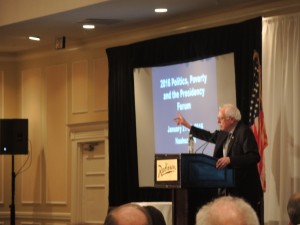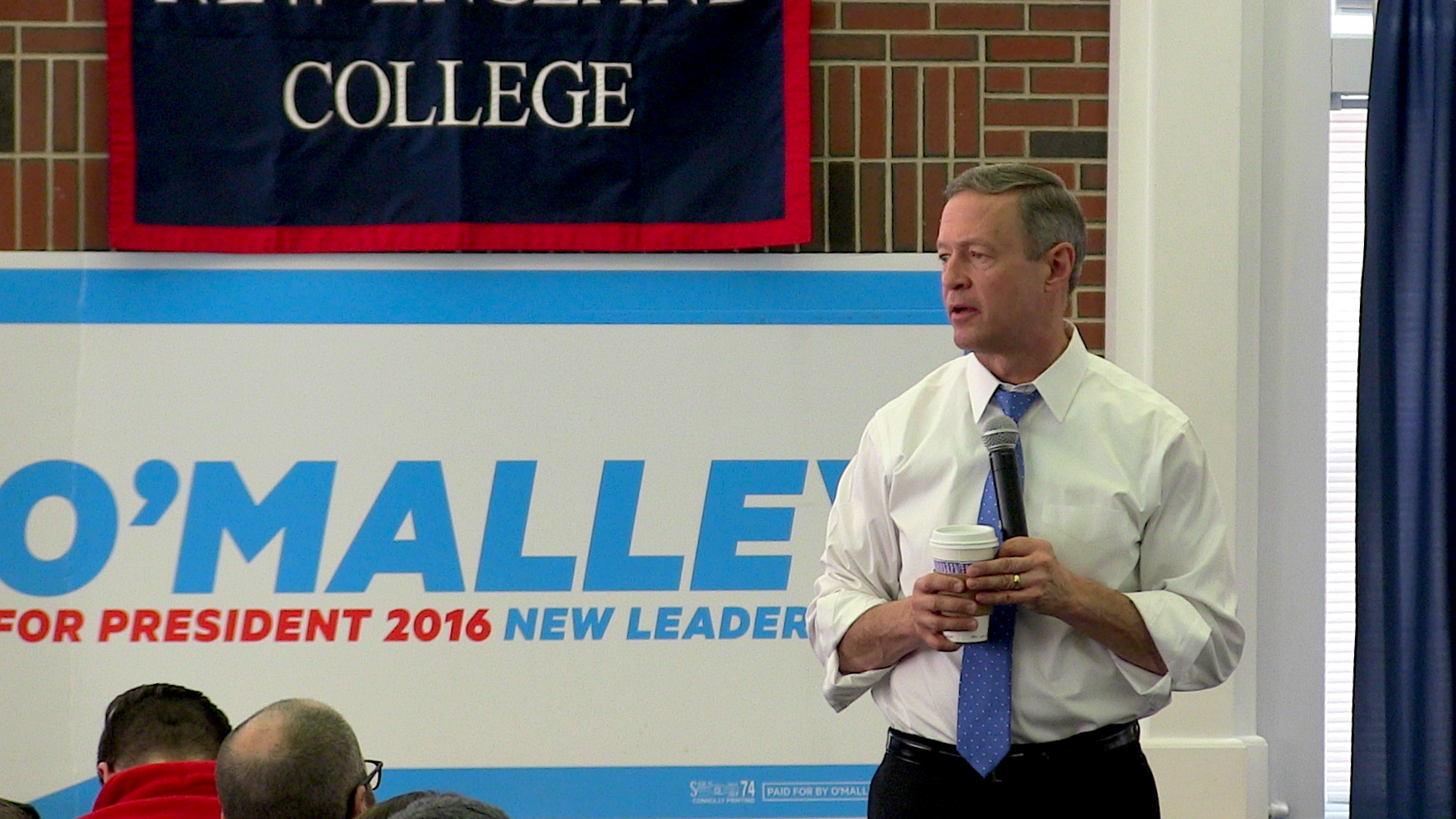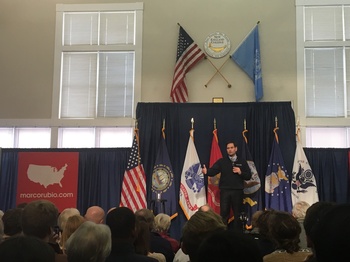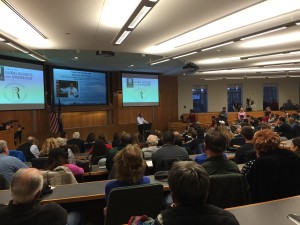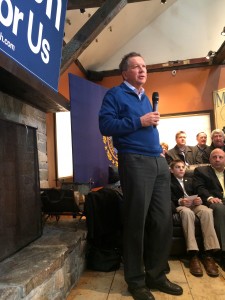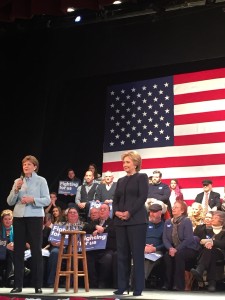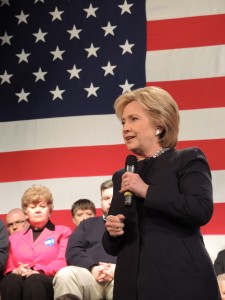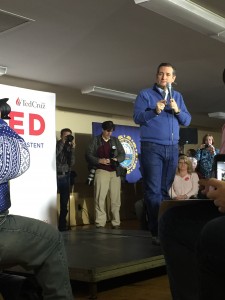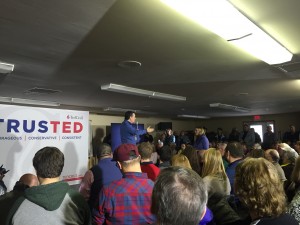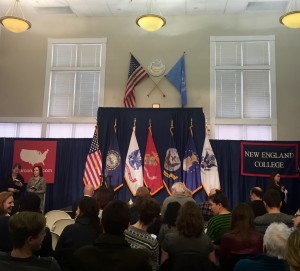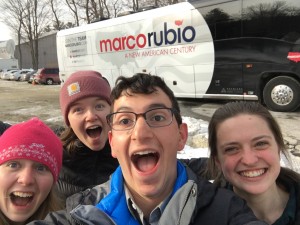For the last month, I have been traveling around New Hampshire and going to campaign events for nearly every candidate (all except Carson and Gilmore). I have waited three hours to watch Hillary Clinton speak, taken a funny video with Marco Rubio, and memorized more than one candidate’s stump speech.
As the election comes to a close, crowds have gotten bigger and events have become more frequent. A committed political nerd with a car can make it to four campaign events a day, such as my friends and I have done. And a few dozen events and a few thousand miles in the car have provided me with more than enough time to have a deep, holistic understanding of the New Hampshire primaries. Here’s my take:
The Big Winners: Bernie, Trump, and Kasich.
Bernie: Bernie is going to have a clear victory tonight. While he has been speaking in packed gyms and conference rooms throughout the state, his supporters are out in force canvassing and phone banking. My best guess is that Bernie will take 55% of the Democratic vote.
Trump: Donald has been dominating in the polls for a long time in New Hampshire. As we saw in Iowa, he will not end up as high as the polls show, but still a clear Trump victory is to be expected. Notably, his events have changed in tone from the ranting Trump we’ve come to know to more of an organized stump speech. His event last night in Manchester was the place to be for everyone north of Boston; it seemed that almost half the crowd did not support him, but just came for the last New Hampshire Trump circus.
Kasich: Ohio’s governor will surprise a lot of people with his performance tonight. He has been battling with Rubio for second place for a while and Saturday night’s debate sealed the deal. After tonight’s finish he’ll look to build a coalition around himself as the top moderate Republican governor, above Bush and Christie, as quickly as possible. The most highly coveted position in the Republican field right now is in second place as the anti-Trump. Kasich will hold it for a while, but he can only withstand being on the receiving end of attacks for so long until his support wavers.
They Needed More: Rubio, Bush, and Cruz
Rubio: Aiming to take second place in New Hampshire after his big night in Iowa, Rubio may not be able to achieve his goals. The gaffe on Saturday hurt him significantly, so he will have to settle for third. It still puts him as the most electable candidate to take on Trump, but third place is not enough for party leaders to coalesce around him yet.
Bush: Jeb came into New Hampshire needing a big win. Unfortunately for him, he will land in the middle of the gubernatorial pack. It is enough to outlast Christie, but he needs to assert himself as the top Republican governor in the race if he wants to stay in until the end.
Cruz: After his win in the Hawkeye State, Cruz aimed to become the Republican’s anti-Trump candidate. It hasn’t happened yet. With demographics that don’t play well to Cruz’s strengths, especially religion, he won’t be able to carry the momentum forward much more. He will need to do very well in South Carolina to reestablish himself a top three candidate.
The Losers: Clinton, Christie, Fiorina, Carson, and Gilmore
Clinton: Hillary’s loss tonight will set the Clinton Camp back a few steps, but nothing they have not prepared for. After a virtual tie in Iowa, Bernie will have strong momentum going into South Carolina and Nevada, but he won’t fare as well there. The real dividing point will be on Super Tuesday where Clinton’s money, organization, and staff will place her as the clear frontrunner again.
Christie: There has been no one more effective at town halls that I have seen as Chris Christie. After many events I’ve overheard attendees say “I was undecided before, but I’m definitely voting Christie now.” People love how he speaks bluntly and directly. However, he was unable to reach enough voters in time. I think he will take a clear 6th place in the polls, but not high enough to stick in the race until March.
Fiorina: The former CEO has proven strong on the debate stage, but her boost from it came too early to help. Leaving New Hampshire with a performance in the low single digits, the real question for Fiorina is how long to keep fighting.
Carson: Carson has not been campaigning much in the Granite State and his numbers are bound to show it. He’ll need to reappear on the radar in South Carolina if he hopes to stay in until March, but I doubt that will happen.
Gilmore: Yes, he is still running. Hopefully he can break his record of 12 votes in Iowa, but it will not make a difference.
In summary, here’s the lineup:
Republicans: Trump (29%), Kasich (19%), Rubio (15%), Cruz (14%), Bush (12%), Christie (7%), Fiorina (3%), Carson (1%), Gilmore (0%)
Democrats: Sanders (55%), Clinton (45%)

